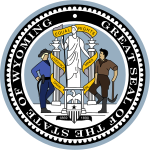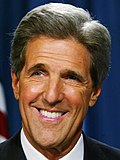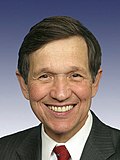
Each of the 50 U.S. states, the District of Columbia, and territories of the United States holds either primary elections or caucuses to help nominate individual candidates for president of the United States. This process is designed to choose the candidates that will represent their political parties in the general election.

Super Tuesday is the United States presidential primary election day in February or March when the greatest number of U.S. states hold primary elections and caucuses. Approximately one-third of all delegates to the presidential nominating conventions can be won on Super Tuesday, more than on any other day. The results on Super Tuesday are therefore a strong indicator of the likely eventual presidential nominee of each political party.
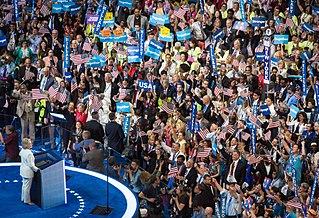
The Democratic National Convention (DNC) is a series of presidential nominating conventions held every four years since 1832 by the United States Democratic Party. They have been administered by the Democratic National Committee since the 1852 national convention. The primary goal of the Democratic National Convention is to officially nominate a candidate for president and vice president, adopt a comprehensive party platform, and unify the party. Pledged delegates from all fifty U.S. states, the District of Columbia, and the American territories, and superdelegates which are unpledged delegates representing the Democratic establishment, attend the convention and cast their votes to choose the party's presidential candidate. Like the Republican National Convention, the Democratic National Convention marks the formal end of the primary election period and the start of the general election season. Since the 1980s, national conventions have become mostly inaugural events for the winning candidate, since winners are announced long before the convention. In 2020, both major parties, and many minor parties, replaced their usual in-person conventions with virtual programs due to the COVID-19 pandemic.
In American politics, a superdelegate is a delegate to a presidential nominating convention who is seated automatically.
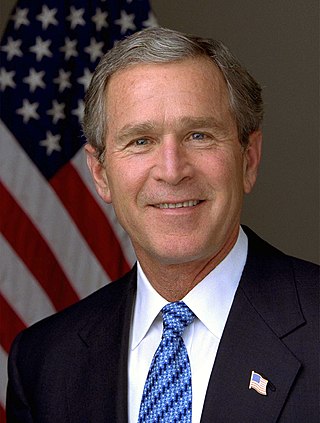
From January 19 to June 8, 2004, voters of the Republican Party chose its nominee for president in the 2004 United States presidential election. Incumbent President George W. Bush was again selected as the nominee through a series of primary elections and caucuses culminating in the 2004 Republican National Convention held from August 30 to September 2, 2004, in New York City.

The 2004 United States presidential election in Illinois took place on November 2, 2004, and was part of the 2004 United States presidential election. Voters chose 21 representatives, or electors to the Electoral College, who voted for president and vice president.

The 2008 Oklahoma Democratic presidential primary, part of the process of selecting that party's nominee for President of the United States, took place on February 5, one of the many nominating contests of 2008's "Super Tuesday". The primary election chose 38 pledged delegates to represent Oklahoma at the 2008 Democratic National Convention. The remainder of Oklahoma's 47 delegates consisted of unpledged superdelegates not bound by the results of the primary. The election was a closed primary, meaning that only registered Democrats could vote in this election. Hillary Clinton won the primary by a significant margin.

The 2008 Vermont Democratic presidential primary was an open primary that took place on March 4, 2008. Barack Obama won the primary, his only decisive win among the four March 4 contests. The primary determined the 15 pledged delegates that represented Vermont at the 2008 Democratic National Convention. The delegates were awarded to the candidates, Obama and Hillary Clinton, on a proportional basis. Vermont also sent 8 unpledged "superdelegates", to the convention not bound by the results of the primary.
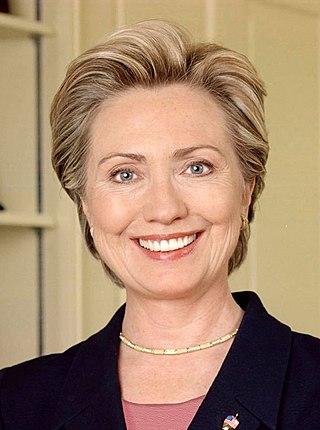
The 2008 Texas Democratic presidential primary and caucuses were a series of events to determine the delegates that the Texas Democratic Party sent to the 2008 Democratic National Convention. Delegates were selected using results from two sources: the Texas Presidential Primary held on March 4 by the Secretary of State of Texas's office, and a series of caucus events held between March 4 and June 7 by the Texas Democratic Party. The indecisive results of Super Tuesday, and the fact that Texas had the largest number of delegates among the states remaining on the Democratic primary calendar, resulted in the Texas primary receiving significant attention from both the Hillary Clinton and Barack Obama campaigns.

The 2004 Pennsylvania Democratic presidential primary took place on April 27, 2004. It was open to registered Democrats only.

The 2004 Oklahoma Democratic presidential primary, part of the process of selecting that party's nominee for President of the United States, took place on February 3, one of the seven nominating contests of 2004's "Mini-Tuesday". The primary election chose 40 pledged delegates to represent Oklahoma at the 2004 Democratic National Convention. The remainder of Oklahoma's 47 delegates consisted of unpledged superdelegates not bound by the results of the primary. The election was a closed primary, meaning that only registered Democrats could vote in this election. Wesley Clark won the primary by a razor-thin margin over John Edwards.

The 2004 Maine Democratic presidential caucuses took place on February 8, 2004 as part of the 2004 United States Democratic presidential primaries. The delegate allocation is Proportional. the candidates are awarded delegates in proportion to the percentage of votes received and is open to registered Democrats only. A total of 24 delegates are awarded proportionally.

The 2004 Nevada Democratic presidential caucuses took place on February 14, 2004 as part of the 2004 United States Democratic presidential primaries. The delegate allocation is Proportional. The candidates were awarded delegates in proportion to the percentage of votes received and the caucus was open to registered Democrats only. A total of 20 delegates are awarded proportionally. A 15 percent threshold was required to receive delegates. Frontrunner John Kerry won the primary with Governor Howard Dean coming in a distant second. Kerry won the Democratic nomination for President of the United States, but lost the general election to incumbent George W. Bush.

The 2004 Wisconsin Democratic presidential primary took place on February 17, 2004 as part of the 2004 Democratic Party presidential primaries. The delegate allocation is Proportional. The candidates are awarded delegates in proportion to the percentage of votes received and is open to registered Democrats only. A total of 72 delegates are awarded proportionally. A 15 percent threshold is required to receive delegates. John Kerry won the primary with John Edwards coming in second.

The 2004 Maryland Democratic presidential primary took place on March 2, 2004 as part of the 2004 Democratic Party presidential primaries. The delegate allocation is proportional; candidates are awarded delegates in proportion to the percentage of votes received, open to registered Democrats only. Frontrunner John Kerry won the primary with former Senator John Edwards coming in a distant second.

The 2012 United States presidential election in California took place on November 6, 2012, as part of the 2012 United States presidential election in which all 50 states plus the District of Columbia participated. California voters chose 55 electors, the most out of any state, to represent them in the Electoral College via a popular vote pitting incumbent Democratic President Barack Obama and his running mate, Vice President Joe Biden, against Republican challenger and former Massachusetts Governor Mitt Romney and his running mate, Congressman Paul Ryan.

The 2004 Tennessee Democratic presidential primary was held on February 10 in the U.S. state of Tennessee as one of the Democratic Party's statewide nomination contests ahead of the 2004 presidential election. The primary determined 69 delegates to the 2004 Democratic National Convention, who were awarded on a proportional basis. John Kerry won with 41.02% of the vote and was awarded 31 delegates.
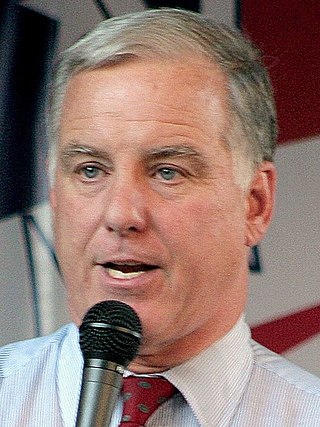
The 2004 Vermont Democratic presidential primary took place on March 2, 2004, as part of Super Tuesday along with other primaries and caucuses held throughout the country. Vermont's 15 pledged delegates were allocated based on the results of the primary.

The 2004 Libertarian Party presidential primaries allowed voters to indicate non-binding preferences for the Libertarian Party's presidential candidate. These differed from the Republican or Democratic presidential primaries and caucuses in that they did not appoint delegates to represent a candidate at the party's convention to select the party's nominee for the United States presidential election. The party's nominee for the 2004 presidential election was chosen directly by registered delegates at the 2004 Libertarian National Convention, which ran from May 28 to 31, 2008. The delegates nominated Michael Badnarik for president and Richard Campagna for vice president.
